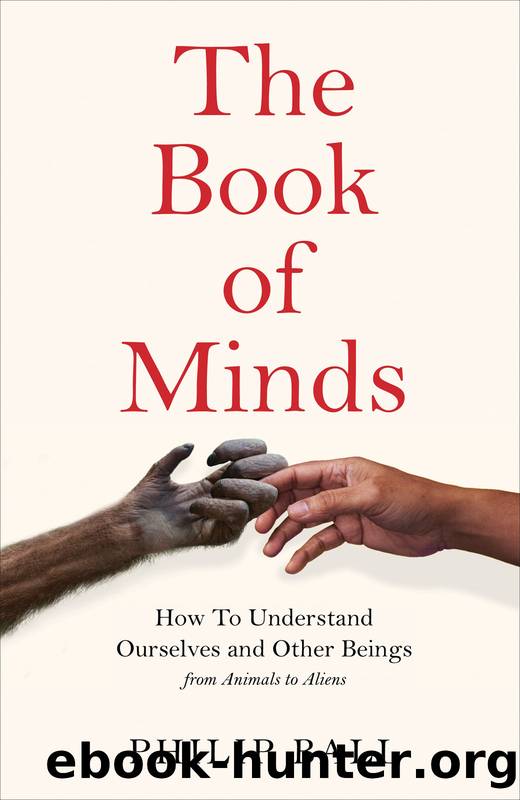The Book of Minds by Philip Ball

Author:Philip Ball [Ball, Philip]
Language: eng
Format: epub
Publisher: Macmillan
CHAPTER 7
Machine Minds
âThe development of full artificial intelligence could spell the end of the human race,â the legendary theoretical physicist Stephen Hawking warned in 2014. That he had no expertise in AI did not prevent the claim from making headlines; after all, Hawking was Hawking. But heâs not alone: tech entrepreneur Elon Musk has warned that AI could be âour biggest existential threat.â Such concerns were reiterated in an âopen letterâ by seemingly more qualified experts early the following year. AI leaders at Google and elsewhere, roboticists, and academic specialists in computer science were among the cosignatories who said that âwe cannot predict what we might achieve when [our] intelligence is magnified by the tools AI may provideâ â but warned that âour AI systems must do what we want them to doâ, for otherwise the consequences could be dire.
Science fiction is filled with tales of AI not doing what we want it to. From the machines of Isaac Asimovâs I, Robot (1950) to HAL 2000 in 2001: A Space Odyssey, and Skynet in the Terminator film franchise, to the malign super-intelligent AIs of The Matrix, we seem positively to revel in the nightmare that our machines will conquer, enslave, and eradicate us.
Our pessimism about the prospects of AI could seem odd â not least from Hawking, who latterly relied on it and related technologies to permit him any kind of communication with the world. He and others who warn of the impending dangers of AI do generally acknowledge the huge benefits it might bring â the open letter mentioned above stated that it âhas yielded remarkable successes in various component tasks such as speech recognition, image classification, autonomous vehicles, machine translation, legged locomotion, and question-answering systemsâ, adding that âThe potential benefits are huge . . . the eradication of disease and poverty are not unfathomable.â Still, we worry if weâre doing the right thing by developing machines that might rival or surpass us in intelligence.
This fear has old roots. It stems partly from a distrust of art and artifice, a conviction that âartificialâ means âunnaturalâ and is thus bound to go awry. The malevolence of the âcreated beingâ finds voice in Mary Shelleyâs Frankenstein (1818), and ever since robots (from the Czech word meaning âserfâ or âindentured labourerâ) made their debut in Karel Äapekâs 1920 play R. U. R. they were portrayed as soulless beings that might wipe out humankind. Asimov called this fear the âFrankenstein complexâ.
The distrust of AI is also a fear of the Other, of the unknown. Because we donât understand the AIâs âmindâ, we project onto it the worst that lurks in our own. The result, though, is a peculiar prospect: those who seem most troubled by our lack of knowledge about the kinds of mind AI might conceivably harbour appear to be oddly sure they know what it will (or at least could) be like.
Yet while some futurologist-prophets insist on forecasting the worst, many of those working at the pit-face of AI research tend to regard these dire warnings with disdain, even despair.
Download
This site does not store any files on its server. We only index and link to content provided by other sites. Please contact the content providers to delete copyright contents if any and email us, we'll remove relevant links or contents immediately.
Kathy Andrews Collection by Kathy Andrews(10519)
The remains of the day by Kazuo Ishiguro(7551)
Spare by Prince Harry The Duke of Sussex(4195)
Paper Towns by Green John(4169)
The Body: A Guide for Occupants by Bill Bryson(3801)
Be in a Treehouse by Pete Nelson(3212)
Harry Potter and the Goblet Of Fire by J.K. Rowling(3045)
Goodbye Paradise(2962)
Never by Ken Follett(2880)
Into Thin Air by Jon Krakauer(2701)
The Remains of the Day by Kazuo Ishiguro(2618)
The Genius of Japanese Carpentry by Azby Brown(2609)
The Cellar by Natasha Preston(2595)
Drawing Shortcuts: Developing Quick Drawing Skills Using Today's Technology by Leggitt Jim(2532)
120 Days of Sodom by Marquis de Sade(2437)
Architecture 101 by Nicole Bridge(2350)
The Man Who Died Twice by Richard Osman(2298)
Machine Learning at Scale with H2O by Gregory Keys | David Whiting(2290)
Fairy Tale by Stephen King(2069)
